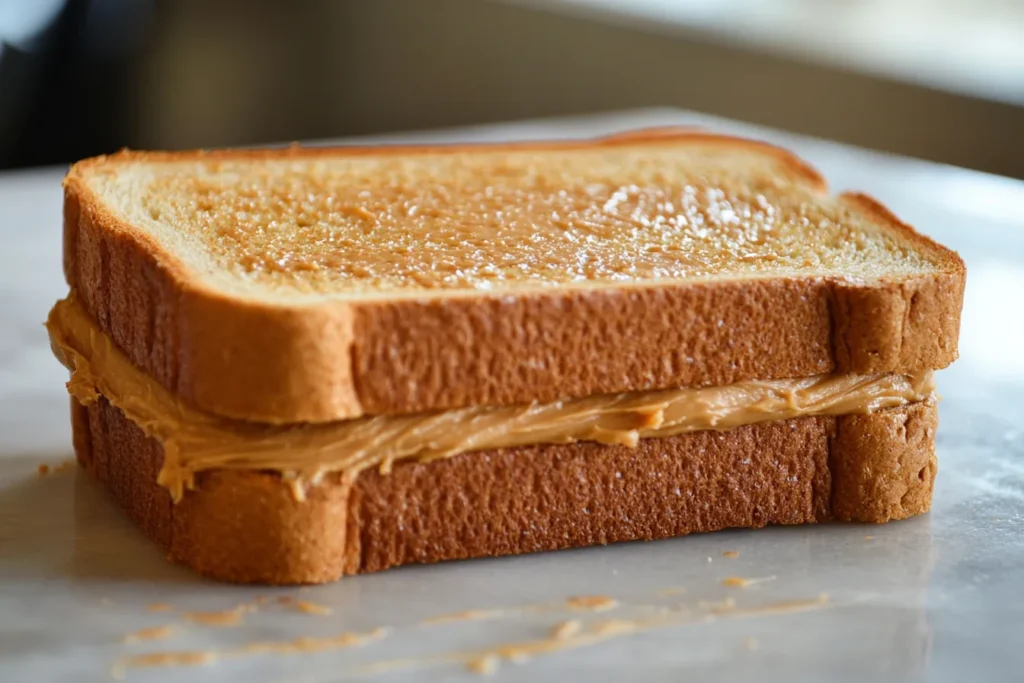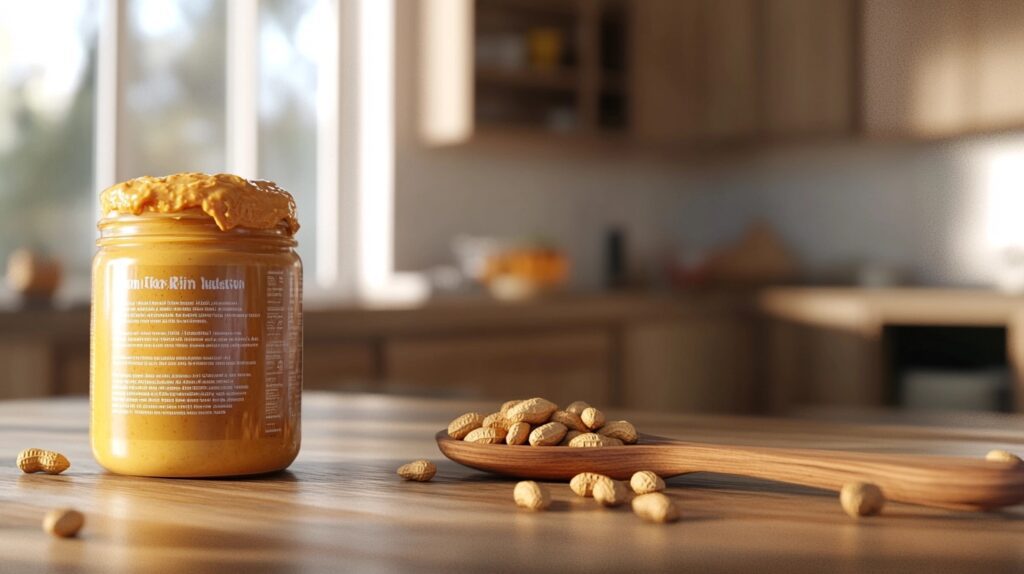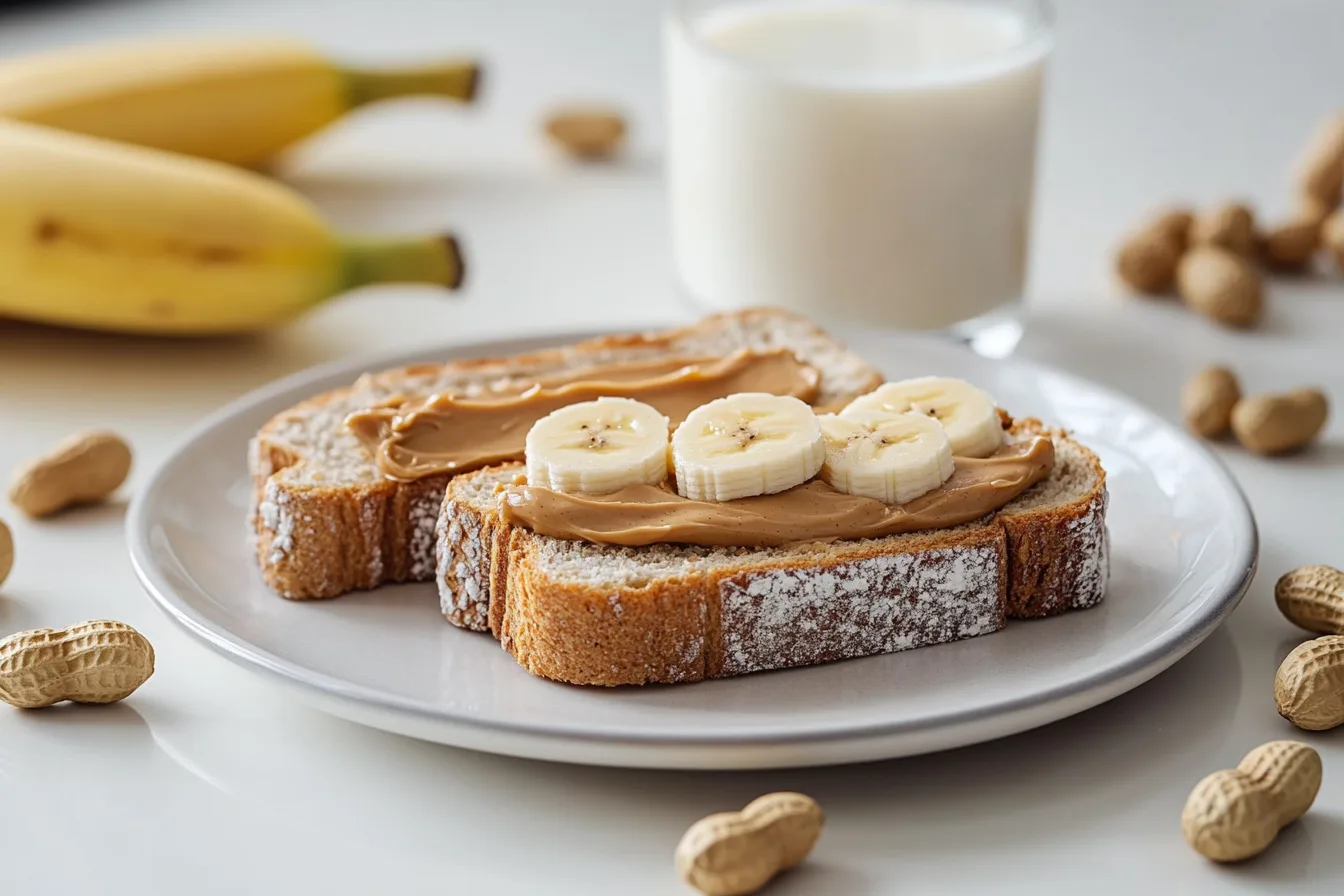Why eat peanut butter before bed? Peanut butter, with its rich blend of protein, healthy fats, and essential nutrients, has long been a beloved snack for people of all ages. But did you know it can also be a smart choice before bedtime? This article explores why eating peanut butter before bed may boost your health, improve sleep, and even curb nighttime cravings. We’ll dive into the science, benefits, and risks, while offering practical tips to make it part of your nighttime routine.
Introduction to Eating Peanut Butter Before Bed
What This Article Covers
Peanut butter isn’t just a tasty treat; it’s a nutritional powerhouse that offers multiple benefits when consumed at the right time. This article examines why peanut butter might be a great addition to your pre-sleep snack lineup, covering its impact on muscle repair, sleep quality, and even heart health.
Why This Topic Matters
Nighttime snacking often gets a bad rap, but not all snacks are created equal. Choosing the right food before bed can significantly affect how well you sleep and how your body repairs itself overnight. Peanut butter stands out because it’s packed with healthy fats, protein, and sleep-enhancing compounds like magnesium and tryptophan. Whether you’re looking to curb late-night hunger, promote relaxation, or maintain muscle health, peanut butter might just be the answer.
Next, we’ll delve into what makes peanut butter so nutritious and explore the components that give it its superfood status.
Nutritional Profile of Peanut Butter
Key Nutrients in Peanut Butter
Peanut butter is more than just a spread; it’s a treasure trove of nutrients that benefit your body in countless ways. Each spoonful contains a rich blend of healthy fats, protein, fiber, and essential vitamins. The monounsaturated and polyunsaturated fats found in peanut butter support heart health and help maintain a balanced diet. Plus, its high protein content aids in muscle repair and growth—making it a popular choice among fitness enthusiasts.
Vitamins like E, B6, and niacin, along with minerals such as magnesium and potassium, play a vital role in supporting nerve function, bone health, and energy production. Additionally, peanut butter is a good source of antioxidants, which combat free radicals and reduce inflammation in the body. No wonder it’s considered a nutritional powerhouse.
Calorie Content and Serving Sizes
While peanut butter is nutrient-dense, it’s also calorie-dense, with about 190 calories per two-tablespoon serving. This makes portion control essential, especially if you’re mindful of your calorie intake. Overeating peanut butter might lead to weight gain, counteracting its benefits. The good news? Even a modest serving can deliver all its nutrients while satisfying your hunger.
Pairing peanut butter with foods like bananas or whole-grain toast can enhance its nutritional impact while creating a balanced, filling snack. Incorporating it into your diet thoughtfully ensures you reap its benefits without overindulging.
Health Benefits of Peanut Butter
Protein for Muscle Repair and Growth
One of the standout benefits of peanut butter is its high protein content. Protein is essential for repairing and building muscles, especially after physical activity. Consuming peanut butter before bed can help your body recover overnight by providing a steady stream of amino acids, which are critical for muscle repair. This makes it an excellent choice for athletes or anyone engaged in regular exercise.
The slow-digesting protein in peanut butter ensures that your muscles receive nourishment throughout the night. Pairing it with a carbohydrate-rich food like a slice of whole-grain bread can further enhance its effectiveness, as the carbs help transport the protein to your muscles.
Healthy Fats and Heart Health
Peanut butter is loaded with monounsaturated fats, which are considered “good fats” for the heart. These fats help reduce bad cholesterol (LDL) levels while boosting good cholesterol (HDL), improving overall heart health. Research shows that diets rich in monounsaturated fats can lower the risk of heart disease and support cardiovascular health over time.
Additionally, the presence of omega-6 fatty acids in peanut butter helps maintain skin health, reduce inflammation, and improve brain function. Unlike trans fats found in processed snacks, the fats in peanut butter are natural and beneficial.
Magnesium for Sleep and Relaxation
Magnesium is another vital nutrient found in peanut butter, known for its role in promoting relaxation and better sleep. This mineral helps regulate neurotransmitters that calm the nervous system, preparing your body for restful sleep. A lack of magnesium has been linked to sleep disorders, so adding magnesium-rich foods like peanut butter to your evening routine can make a big difference.
Moreover, magnesium supports muscle function and reduces the risk of nighttime cramps, ensuring you wake up feeling refreshed and ache-free. Peanut butter, combined with other magnesium-rich foods like bananas, creates a soothing bedtime snack that satisfies your hunger while promoting better sleep.

Peanut Butter as a Sleep Aid
Tryptophan and Its Role in Sleep
Peanut butter contains tryptophan, an essential amino acid that plays a significant role in promoting sleep. Once ingested, tryptophan helps your body produce serotonin, a neurotransmitter that enhances mood and relaxation. Serotonin, in turn, is converted into melatonin, the hormone responsible for regulating your sleep-wake cycle. This sequence makes tryptophan-rich foods like peanut butter an ideal pre-sleep snack.
When you eat peanut butter before bed, you give your body the building blocks it needs to create these sleep-enhancing chemicals. Unlike sleep aids or supplements, peanut butter offers a natural way to wind down at night.
Combining Peanut Butter with Carbohydrates
While peanut butter alone is beneficial, combining it with carbohydrates can amplify its sleep-inducing effects. Carbs trigger the release of insulin, which helps more tryptophan enter your brain. A slice of whole-grain toast or a small banana paired with peanut butter creates the perfect balance of protein and carbs for optimal sleep.
This combination not only satisfies late-night cravings but also stabilizes your blood sugar levels, preventing hunger pangs that might wake you up in the middle of the night. It’s a delicious and practical way to support restful sleep while indulging in a nutritious treat.
Potential Risks of Eating Peanut Butter Before Bed
Calorie Overload and Weight Gain
While peanut butter is packed with nutrients, its calorie density can be a double-edged sword. A single serving contains about 190 calories, and it’s easy to exceed the recommended amount without realizing it. If you consume peanut butter in large quantities, especially late at night when your body burns fewer calories, it could lead to weight gain over time.
To avoid calorie overload, stick to portion-controlled servings. Measuring out one to two tablespoons instead of eating directly from the jar can help keep your intake in check. Additionally, pairing peanut butter with lower-calorie options like sliced apples or celery can create a balanced snack without excess calories.
Allergies and Intolerances
Peanut allergies are one of the most common food allergies, and they can range from mild reactions like itching and stomach upset to severe anaphylaxis. If you’re allergic to peanuts or suspect an intolerance, consuming peanut butter before bed could have serious health consequences. Symptoms like bloating, gas, or discomfort might indicate that your body doesn’t tolerate peanuts well.
For those with peanut allergies, there are alternatives like almond butter or sunflower seed butter that offer similar benefits without the risks. Always read labels carefully to ensure the product is free from cross-contamination if allergies are a concern.
Best Ways to Eat Peanut Butter Before Bed

Pairing Peanut Butter with Other Foods
The key to making peanut butter a beneficial nighttime snack is combining it with complementary foods. Pairing peanut butter with options rich in fiber, protein, or healthy carbohydrates creates a balanced and satisfying treat. Here are some great combinations:
- Banana slices with peanut butter: This duo provides magnesium, potassium, and natural sugars for sustained energy and muscle relaxation.
- Whole-grain crackers or toast: The complex carbs in whole grains enhance the absorption of tryptophan, improving sleep quality.
- Apple slices and peanut butter: Apples add a refreshing crunch, fiber, and vitamins, making it a nutrient-rich snack.
- Greek yogurt and peanut butter: This creamy combo delivers a protein-packed treat that supports muscle repair and curbs hunger.
These pairings not only enhance the flavor but also improve the overall nutritional profile, making it a perfect pre-sleep indulgence.
Ideal Portion Sizes
While it’s tempting to indulge in more, moderation is crucial when enjoying peanut butter at night. A serving size of one to two tablespoons is typically enough to deliver its benefits without overloading on calories or fat. Measuring out your portions beforehand can prevent overconsumption and help you stay on track with your dietary goals.
If you’re using peanut butter as a dip or spread, focus on the quality of the base food. Whole, minimally processed options like fruits, vegetables, or whole grains pair well with peanut butter and won’t add empty calories to your snack.
Who Should Avoid Eating Peanut Butter at Night?
People with Peanut Allergies
Peanut butter is undeniably nutritious, but for individuals with peanut allergies, it’s off-limits. Peanut allergies can cause symptoms ranging from mild itching to severe anaphylaxis, which can be life-threatening. If you’re unsure whether you’re allergic, it’s best to consult with a doctor before adding peanut butter to your diet, especially as a nighttime snack.
Fortunately, there are alternatives like almond butter, sunflower seed butter, or tahini, which offer similar nutritional benefits without triggering peanut allergies. These substitutes can be incorporated into your diet without compromising on flavor or nutrients.
Individuals on Low-Calorie Diets
Peanut butter, while nutritious, is calorie-dense, making it less suitable for those on strict low-calorie diets. If your goal is weight loss or calorie control, consuming peanut butter before bed could hinder your progress if not carefully portioned. Even a small serving can contribute significantly to your daily calorie intake.
For such individuals, lighter alternatives like hummus or a handful of almonds may be better bedtime snacks. These options provide healthy nutrients and protein without the same calorie density as peanut butter, ensuring you stay within your dietary limits.
By understanding who may need to limit or avoid peanut butter, you can make more informed decisions about including it in your evening routine.
Scientific Studies and Evidence
Studies Supporting Peanut Butter for Sleep
Several studies highlight the benefits of consuming peanut butter or similar protein-rich foods before bedtime. Research has shown that tryptophan, an amino acid found in peanuts, promotes the production of serotonin and melatonin, which are essential for regulating sleep. A study published in the Journal of Clinical Sleep Medicine noted that foods high in tryptophan could improve sleep duration and quality, particularly when combined with carbohydrates.
Moreover, the magnesium content in peanut butter has been linked to better sleep efficiency. According to a report by the National Institutes of Health, magnesium helps activate mechanisms in the brain that relax the body, contributing to restful sleep.
Including peanut butter as part of a balanced nighttime snack can support these biological processes and enhance your overall sleep experience.
Contradictory Findings
However, not all studies unanimously support eating peanut butter before bed. Some research suggests that consuming calorie-dense foods at night may lead to weight gain if portions are not controlled. A study published in Obesity Reviews emphasizes the importance of monitoring portion sizes, particularly for individuals with a sedentary evening routine, as excess calories are more likely to be stored as fat.
Despite these concerns, when consumed in moderation and paired with nutrient-rich foods, peanut butter remains a practical option for those seeking a satisfying and health-conscious nighttime snack.
FAQs
Does Peanut Butter Cause Weight Gain?
Peanut butter doesn’t inherently cause weight gain, but it’s calorie-dense, meaning overeating it can contribute to excess calorie intake. Sticking to portion-controlled servings—around one to two tablespoons—can help you enjoy the benefits without tipping the scales.
Is Peanut Butter Good for Insomnia?
Yes, peanut butter can be beneficial for insomnia due to its tryptophan content, which aids in the production of serotonin and melatonin. These compounds help regulate sleep patterns and promote relaxation, making peanut butter a natural choice for combating sleeplessness.
What Are Alternatives to Peanut Butter?
For those allergic to peanuts or seeking variety, alternatives like almond butter, sunflower seed butter, or tahini offer similar health benefits. These options are rich in protein and healthy fats, making them suitable substitutes for a bedtime snack.
How Much Peanut Butter Is Too Much?
Consuming more than two tablespoons of peanut butter per sitting may lead to excess calorie intake, especially at night. Moderation is key to reaping its benefits without risking weight gain or digestive discomfort.
Can Kids Eat Peanut Butter Before Bed?
Yes, peanut butter can be a healthy bedtime snack for children, provided they don’t have a peanut allergy. Pairing it with fruits or whole-grain crackers can create a nutritious snack that keeps them full and promotes good sleep.
What Type of Peanut Butter Is Best?
Natural or organic peanut butter with minimal added sugar and no hydrogenated oils is the healthiest choice. These options retain the nutritional benefits of peanuts without the unhealthy additives found in some commercial brands.
Conclusion: Final Thoughts on Peanut Butter Before Bed
Peanut butter is more than just a tasty snack—it’s a nutritional powerhouse with benefits that make it an excellent addition to your nighttime routine. Packed with protein, healthy fats, and essential nutrients like magnesium and tryptophan, peanut butter can support muscle repair, enhance sleep quality, and keep late-night hunger at bay.
When paired with complementary foods like bananas, whole-grain toast, or apple slices, peanut butter becomes part of a well-rounded bedtime snack that satisfies cravings without compromising health. However, portion control is key, as its calorie density can lead to weight gain if overindulged.
It’s equally important to consider individual factors, such as allergies or dietary goals, when deciding whether peanut butter is right for you. For those who can enjoy it, peanut butter is a versatile and nutritious way to end the day on a healthy note. By understanding its benefits, risks, and best practices, you can make informed choices that align with your lifestyle and wellness goals.
So, next time you’re looking for a quick, satisfying snack before bed, reach for a jar of peanut butter—it might just become your new favorite nighttime ritual.

